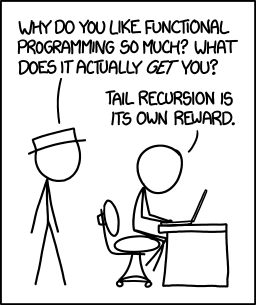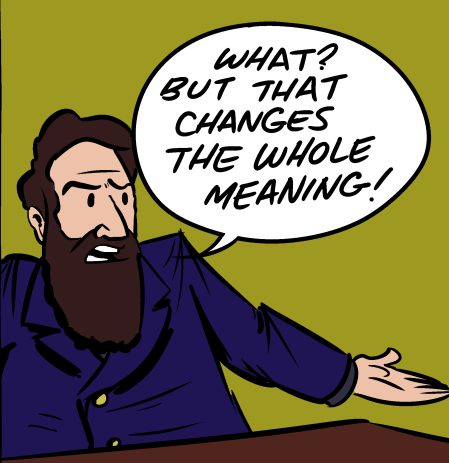X combines the P of Q with the R of Q
The most recent xkcd:

The mouseover title: "Functional programming combines the flexibility and power of abstract mathematics with the intuitive clarity of abstract mathematics."
Read the rest of this entry »
The most recent xkcd:

The mouseover title: "Functional programming combines the flexibility and power of abstract mathematics with the intuitive clarity of abstract mathematics."
Read the rest of this entry »
This is a guest post by Bill Benzon, in response to earlier posts by Hannah Alpert-Abrams and Dan Garrette ("Computational linguistics and literary scholarship", 9/12/2013) and David Bamman ("On Interdisciplinary Collaboration and "Latent Personas"", 9/17/2013).
Read the rest of this entry »
Piraro makes the point that he is allowed to publish a cartoon showing a street prostitute holding up a sign saying "GLUTEN FREE" (see it here), but he was censored when he came out with a cartoon showing a deadbeat vampire loiterer holding up a sign saying "WILL SUCK FOR BLOOD". Both clearly suggest the possibilty that oral sex is being referred to, if you have a dirty mind, but the second explicitly contains a word (suck) commonly recognized by the relevant prudish authorities as colloquial sex talk, wheras the first doesn't. The prostitute cartoon would doubtless also have been banned if it had incorporated the word eat, instead of just implying it through the reference to a potentially allergenic food ingredient. Piraro's comment on the situation is: "Americans (and maybe all humans, I'm not sure) are more obsessed with words than with their meanings."
Read the rest of this entry »
Permalink Comments off
Jill Anderson, "Misreading Like a Lawyer: Cognitive Bias in Statutory Interpretation", Harvard Law Review, Vol. 127, 2014, Forthcoming:
Statutory interpretation dilemmas arise in all areas of law, where we often script them as scenes of conflict between a statute’s literal text and its animating purpose. This article argues that, for an important class of disputes, this supposed discord between text and purpose is an illusion. In fact, lawyers are overlooking ambiguities of literal meaning that align well with statutory purpose. The form of ambiguity in question inheres not in individual words, but at the level of the sentence. What triggers a split in readings are verbs that linguists classify as "opaque," which are perfectly common in legal texts: intend, impersonate, endeavor, and regard are among them. In ordinary speech we resolve their dual readings unconsciously and without difficulty. In law, however, our failure to notice multiple readings of ambiguous language has left a trail of erroneous judicial determinations and doctrinal incoherence across a broad swath of law, from disability rights to white collar crime to identity fraud to genocide. Drawing on examples from these areas, this Article uses the tools of formal semantics to expose the ambiguity of opaque constructions and to make visible the family resemblance among the ways we misinterpret them. It then turns to the question of why lawyers misread and what we can do about it. The converging literatures of language development and the psychology of reasoning suggest an answer. When we analyze opaque sentences explicitly as statutory interpretation requires (as opposed to spontaneously in conversation), we may be particularly vulnerable to cognitive bias. Factors peculiar to law tend to amplify and propagate this bias instead of dampen and contain it, but they may also point the way toward more sophisticated legal reading.
Read the rest of this entry »
I've been reading way too much Victor Mair. In the restaurant of my hotel in London I just saw an English girl wearing a T-shirt on which it said this:
| H | O |
| P | E |
And I immediately thought, who is Ho Pe?
Read the rest of this entry »
Permalink Comments off
Tim Marchman & Reuben Fischer-Baum, "Who Is The Most Pompous Sports Pundit? A Scientific Investigation", Deadspin 9/25/2013:
Of all the stupid rhetorical plays columnists use—issuing thundering imperatives, positioning their banal opinions as the exact midpoints between varieties of unyielding madness, championing their cronies' worthless businesses as examples of the disciplinary power of markets, etc. etc.—the funniest are always the ones that reveal they truly do regard themselves as small stars, able to fix planets in orbit around them through the gravitational pull of their self-regard.
Read the rest of this entry »
A few weeks ago, the Verein Deutsche Sprache awarded its 2013 Sprachpanscher prize to the Duden dictionary, for Duden's role in the "shitstorm" shitstorm ("'Shitstorm' Shitstorm: Dictionary Wins Award for Ruining German", Spiegel OnLine):
The most respected dictionary in the German-speaking world has come under fire for its excessive use of English words.
The Association for the German Language (VDS) — a group that campaigns to protect and promote German — gave the dictionary its annual "Sprachpanscher" (language adulteror) award, which singles out people or organizations responsible for legitimizing anglicisms in German.
(For background, see "Das Wort "Shitstorm" hat nun einen Platz im Duden", 7/4/2013.)
Read the rest of this entry »
The phrase "American exceptionalism" has been much in the news ever since Russian President Vladimir Putin wrote an op/ed piece in the New York Times taking issue with President Obama's statement that America's foreign policy "makes us exceptional." "I would rather disagree with a case he made on American exceptionalism," Putin countered. "It is extremely dangerous to encourage people to see themselves as exceptional, whatever the motivation."
Putin's comments revived an old discussion about the origins of the phrase. On Talking Points Memo, Josh Marshall addressed an article by Terrence McCoy that appeared last year on The Atlantic's website, "How Joseph Stalin Invented 'American Exceptionalism.'" And on Real Clear Politics, Robert Samuelson wrote that "the most interesting fact to surface in the ensuing debate over "American exceptionalism" is that the phrase was first coined by Putin's long-ago predecessor, Joseph Stalin." But should Stalin get the credit?
Read the rest of this entry »
Yesterday morning in class, I had all the students from China pronounce a word I wrote on the board — gē'ermen 哥儿们 ("pals; buddies; brothers") — and everybody was astonished to hear with their own ears the enormous differences in the way the word was pronounced, even though each student thought they were speaking standard Mandarin. This was not due to dialectal variation — because when I asked a few of the students to pronounce the word according to their home topolect, then it would come out in a quite different manner — but simply to individual differences in the realization of gē'ermen 哥儿们 in Mandarin.
Read the rest of this entry »
From today's SMBC (click on the image for the full panel):

Read the rest of this entry »